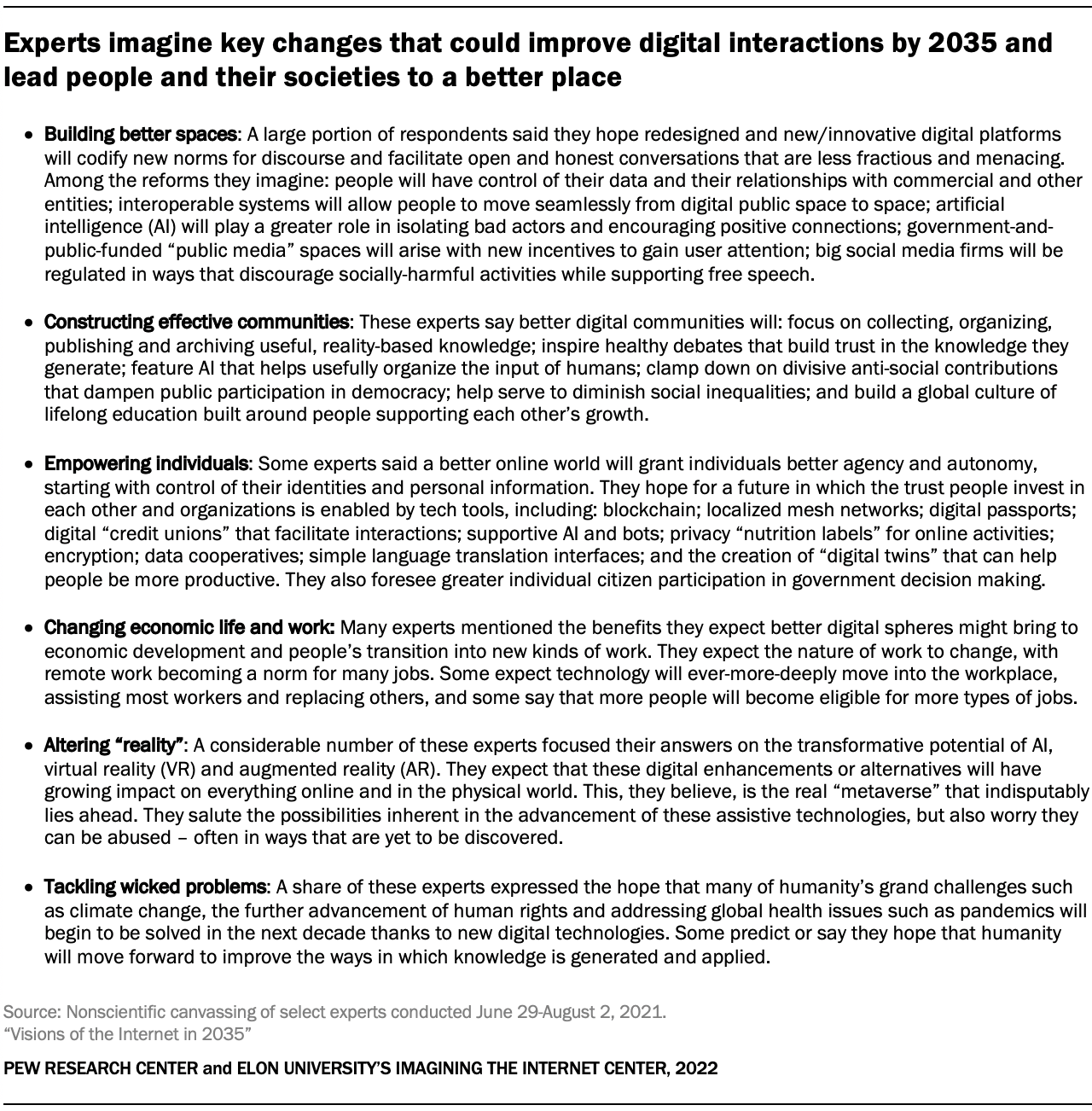Asked to ‘imagine a better world online,’ experts hope for a ubiquitous – even immersive – digital environment that promotes fact-based knowledge, offers better defense of individuals’ rights, empowers diverse voices and provides tools for technology breakthroughs and collaborations to solve the world’s wicked problems

This is the second of two reports emerging from the 13th “Future of the Internet” canvassing Pew Research Center and Elon University’s Imagining the Internet Center have conducted together to gather expert views about important digital issues. In this report, the questions focused on the prospects for improvements in the tone and activities of the digital public sphere by 2035. This is a nonscientific canvassing based on a nonrandom sample; this broad array of opinions about where current trends may lead in the next decade represents only the points of view of the individuals who responded to the queries.
Pew Research Center and Elon’s Imagining the Internet Center built a database of experts to canvass from a wide range of fields, inviting professionals and policy people based in government bodies, nonprofits and foundations, technology businesses and think tanks, as well as interested academics and technology innovators. The predictions reported here came in response to a set of questions in an online canvassing conducted between June 29 and Aug. 2, 2021. In all, 434 technology innovators and developers, business and policy leaders, researchers and activists responded to the question covered in this report. More on the methodology underlying this canvassing and the participants can be found in the section titled “About this canvassing of experts.”
This report is the second of two analyzing the insights of hundreds of technology experts who responded in the summer of 2021 to a canvassing of their predictions about the evolution of online public spaces and their role in democracy in the coming years. In response to the primary research question, many said they expect that these forums will be significantly improved by 2035 if reformers, big technology firms, governments and activists tackle the problems created by misinformation, disinformation and toxic discourse. At the same time, they expressed ongoing concerns about the destructive forces in culture and technology that could continue to plague online life and disrupt beneficial change in the coming years.
In that canvassing, Pew Research Center and Elon University’s Imagining the Internet Center asked a follow-up question inviting these experts to share their vision for what a better digital world could be like in 2035. This report covers scores of those responses. Many envisioned a vastly more hospitable online environment that facilitates socially enriching relationships; the flowering of knowledge-creating communities; growth of truth-seeking group discussions; and new kinds of interactions enabled by artificial intelligence (AI), virtual reality (VR) and augmented reality (AR). At best, they imagine tech-aided collaborations – sometimes global in scale – that can tackle the world’s most pressing questions.
In all, 434 technology innovators, developers, business and policy leaders, researchers and activists provided open-ended responses to this question:
We invite you to imagine a better world online: What is one example of an aspect of digital life that you think could be different in 2035 than it is today? We invite you to create a vignette of something you would like to see taking place in a “new and improved” digital realm in 2035. Your example might involve politics or social activities or jobs or physical and mental health or community life or education. Feel free to think expansively – and specifically.
The key themes these experts voiced in their written responses are outlined in the following table.

This is a nonscientific canvassing, based on a nonrandom sample. The results represent only the opinions of the individuals who responded to the queries and are not projectable to any other population.
It is important to note that even those who sketched out the desirable way things could evolve by 2035 often acknowledge that bad actors and bad systems can thwart change in online life. Indeed, in answering other questions in the canvassing, they spelled out ways that corporations, governments and the public might disrupt positive change in digital spaces. It is also worth noting that the responses were gathered in mid-summer of 2021. People’s responses came in the cultural context of the ongoing COVID-19 pandemic, and at a time when rising concerns over climate change, racial justice and social inequality were particularly prominent – and half a year after the Jan. 6, 2021, attack at the U.S. Capitol in the aftermath of one of the most highly contentious U.S. presidential elections in recent history.
Many of the answers reported here track with the core issues raised by Mike Liebhold, distinguished fellow, retired, at The Institute for the Future, in his answer to this query. He commented: “A revolution in technology education and media services is required to help populations adapt safely to radical changes in digital experiences that are expected to arrive by 2035. Here are some of the core questions that must be asked:
- How do we develop security and privacy technologies and practices sufficient to protect most people and organizations in these new settings?
- How do we develop basic cognitive and behavioral science-supporting, cybertech-aware pedagogies and curricula to protect humans (provide immunity) from systemic vulnerabilities to epidemics of false, misleading, or true-yet-malign persuasive data and media?
- How do we live and thrive in a dangerous digital world of pervasive vulnerabilities across systems and a perpetual spiral of exploits and patches – a world with continued potential for significant cyber outages?
- How do we find a way to live and thrive in a setting that features these three concurrent economic systems?
- Secure private identity and data
- Open/public identity and data
- Surveillance data (pervasive sensing and intrusive analytics).”
Some of the more intriguing predictions from those canvassed included:
- Physical spaces and virtual spaces will be seamlessly integrated, and digital technologies will disappear so completely into our lives and surrounding environments that we will barely notice it. Some call it a “metaverse,” but it has several meanings and manifestations to different experts.
- Super-sophisticated warning systems will be widely employed in many domains, including health care, community well-being, environmental assessments, housing and commercial activities; and rapid-response collaborative groups will be poised to address problems identified by those warning systems. Relatedly, community service hubs will exist to handle citizen and customer issues.
- A new class of professionals – coders, information curators, literacy advisors – will arise to help digital platforms encourage democratic behaviors. They will enable a “culture of accountability” in parts of the internet that is deeply trusted.
- Networked bands of activists will arise in younger generations to press for structural political change and much of civic life will be shaped by “K-pop fan armies.”
- In lawmaking itself, “citizen juries” could be empaneled to bring “collective imagination” to legislating and rule-making and then eventually make their own decisions about economic and civic life. This will lead to much more public input into everything from government budgeting to regulating the environment.
- New forms of digital property and a new regime of copyright and ownership will be commonplace.
- A Human API (application programming interface) will be designed to store and enforce the rules people set about what is allowed to come into their awareness, what takes up their time and what information is shared about their activities.
- The continued challenges to big systems like capitalism, representative democracy and nation-states will push people toward hyperlocal “sovereignty” – both geographic and by personal affinities and interests.
- A large-scale educational ecosystem will emerge to meet people’s formal and informal learning needs and it will be buttressed with a similarly impressive credentialing and testing regime to give people and employers feedback on those participating in the system.
- A Digital Bill of Rights will govern at least a share of the activity that occurs online.
- A sharing economy will arise to challenge the economy based on owning property; subscription models also supplant ownership regimes.
- The sensibilities of service science will emerge and be employed in communities and industries.
In his answer to this canvassing, Doc Searls, internet pioneer, co-author of “The Cluetrain Manifesto” and “The Intention Economy” and co-founder and board member at Customer Commons, shared a detailed vision based on work in progress to improve the internet, including details about Self-Sovereign Identity, Emancipay, the Intention Byway, persistent compute objects (or picos), “palgorithms” and “intentrons.”
In the next section, we highlight his remarks along with the thoughts of several experts who gave some of the most wide-ranging answers or incisive responses to our request for them to describe a better world online by 2035. Following it, we offer a number of additional sections with respondents’ comments organized under the set of themes set out in the table above.
The remarks made by the respondents to this canvassing reflect their personal positions and are not the positions of their employers; the descriptions of their leadership roles help identify their background and the locus of their expertise. Some responses are lightly edited for style and readability.